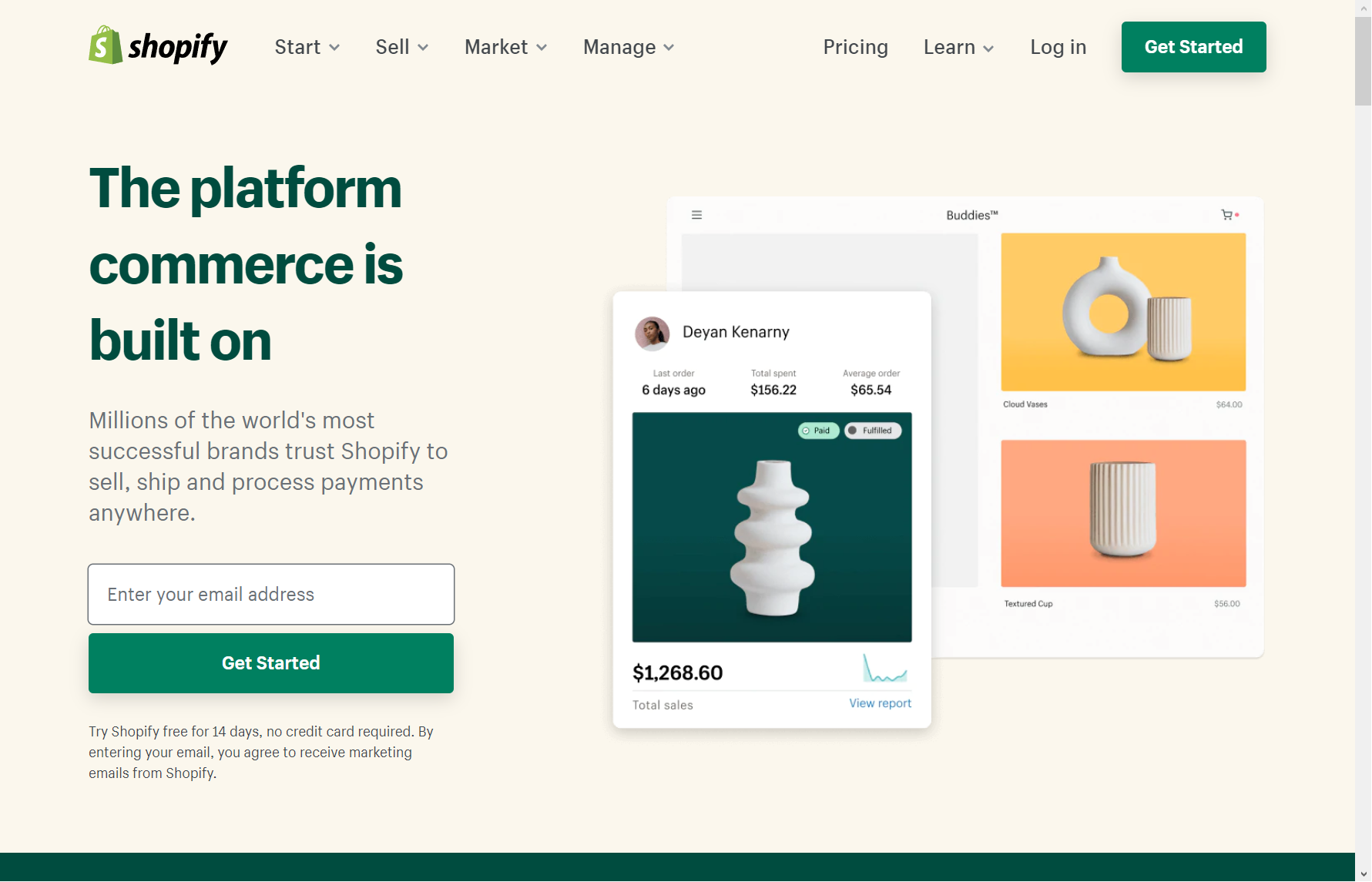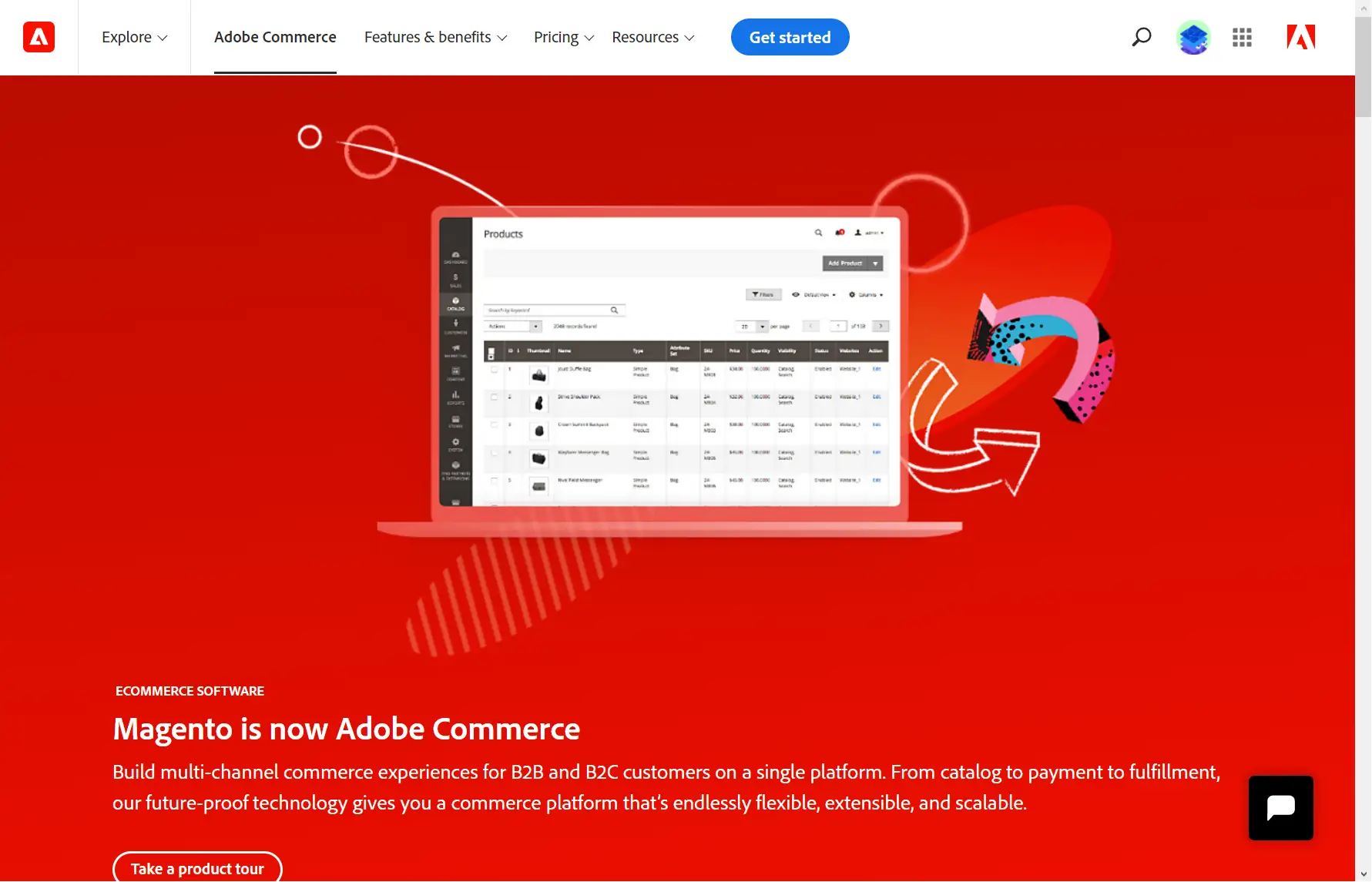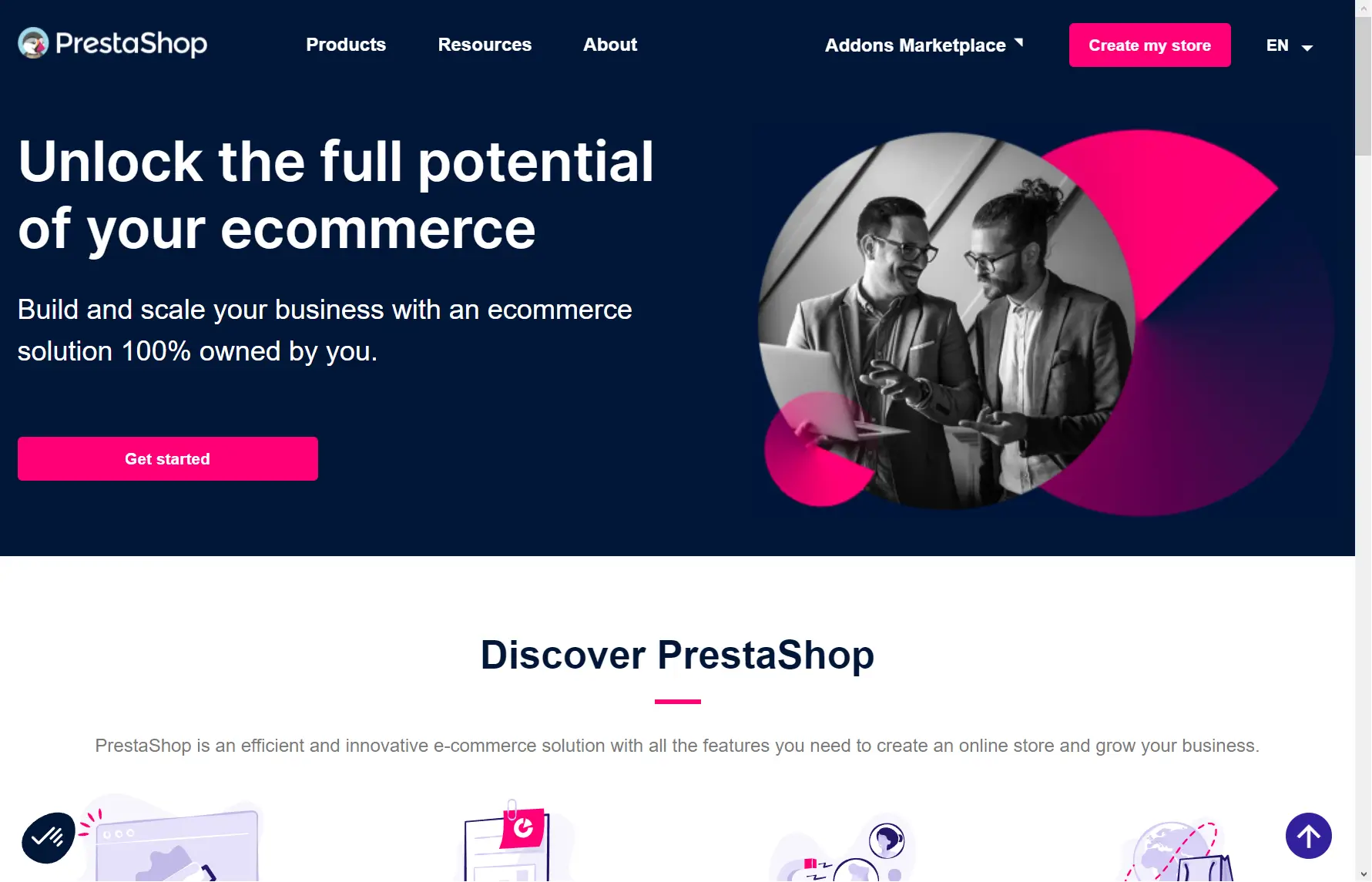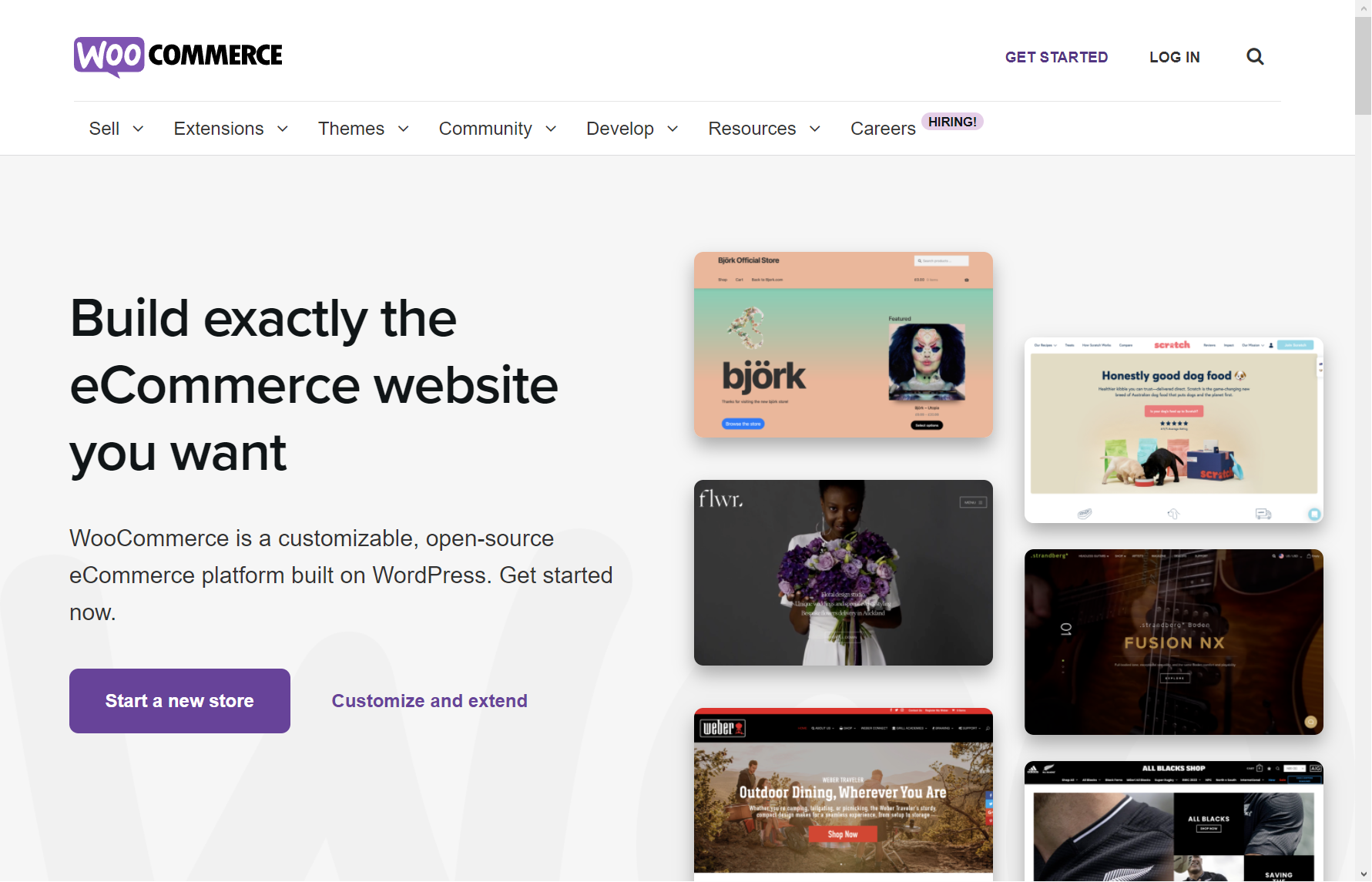More and more Ecommerce platforms are becoming available. Ecommerce platforms are a great solution for users looking to sell their products online. We have identified 6 top eCommerce platforms for the year 2024.

The top 6 eCommerce platforms include WooCommerce, Shopify, Magento, PrestaShop, Wix and Squarespace. Each of these eCommerce platforms offers great features and templates. This ensures that every customer finds something for themselves.
What are the costs to build, maintain, and update your eCommerce platform?
The cost of building, maintaining and updating your eCommerce website will vary depending on a wide range of factors.
First, let’s consider the cost of building your eCommerce store. The cost of building an eCommerce store will depend on the design. The design includes content writing & product images costs. Additionally, you need to consider 👉 e-commerce theme 👈 costs, payments options costs, etc. A key factor is the eCommerce platform that you choose. You may decide to use Shopify, PrestaShop or Wix for your eCommerce platform. Another factor that may impact eCommerce building costs will include search engine optimization.
For more information about the price of building an eCommerce store, click 👉 e-commerce solutions cost. 👈
In terms of costs to maintain your eCommerce platform, here are some things to keep in mind. You want to consider hosting costs and domain name renewal costs. Additionally, take into consideration SEO costs and regular web maintenance costs. These are costs should be covered on a monthly or annual basis, depending on the factor.
Lastly, you will want to factor in the costs of updating your ecommerce website. The price to upgrade your eCommerce platform, will vary depending on your specifications. If you are wishing to switch eCommerce platforms and start from zero, this will cost more. However, if you are just looking to re-fresh your existing online shop this will be less expensive.
What factors should you consider when selecting an eCommerce solution?
The IT industry is constantly changing and developing. In 2024, when choosing an eCommerce platform solution, you should consider the following three factors:
1. Mobile-friendliness
Most of us are constantly on the go and are highly dependent on our mobile devices. You want your eCommerce store to be mobile friendly 📱. Remember that your customers will be making most of their purchases from their phone. You want the e-Commerce platform that you choose to allow for secure payments via a phone or tablet. Some eCommerce platforms such as Shopify offers mobile friendliness this as a standard options. While on other eCommerce platforms it is at an added cost.
Also, mobile friendliness can be a key feature for you as the user running the online shop. Shopify allows you to track and edit your eCommerce store, from the comfort of your phone or tablet. You no longer have to rush to your laptop or desktop computer to work on your eCommerce shop.

2. SEO-friendliness
You want an eCommerce platform to be SEO friendly. You want customers to be able to find your online shop. Furthermore, you want to be able to add content that will be picked up by Google and placed in the most top ranked spots. Moreover, you want your products, categories and much more to be customizable. The customization allows them to be easily found on any browser.

3. Security
eCommerce shops need to follow certain guidelines. These guidelines ensure that they are secure for you and your customers to use. This security is heavily centered around transactions. The way a transaction takes place online has to follow guidelines and protocols. Good elements to have in place, to gain customer trust, include things such as:
- Privacy – preventing data to be shared with third party companies
- Integrity – information that is shared by the customer remains confidential and unaltered
- Authentication – proof that the seller and the buyer are real. Your customer provides ID during checkout
- Non-repudiation – the buyer follows through on the transaction that they initiated.
4. Page speed & performance
Like the old saying goes, time is money 💰. In the world of e-commerce, this could not be more true. A slow performing eCommerce shop reflects poorly on your business. This in turn leads to fewer profits. You want an eCommerce store that loads quickly for a few reasons:
- Fast eCommerce shops earn top ranked slots on browsers like Google
- Speedy eCommerce platforms also provide higher conversion rates among customers. This means that the customer saw the ad, clicked on it and bought the product you are selling
- An efficient eCommerce platform also leads to bigger customer loyalty. When a customer uses your online shop to purchase products and can do so quickly. They will be more likely to come back.
You can accomplish quicker loading eCommerce sites by using a headless CMS. Some of the most popular eCommerce platform options that offer headless CMS, include:
- Shopify eCommerce
- Bigcommerce
- Snipcart
Introducing the best eCommerce Platforms
There are many eCommerce platforms to choose from in 2024. Some of these platforms are well established and well known. Whereas some eCommerce platforms are just gaining popularity. Here is a list of the best eCommerce platforms available for anyone looking to sell online. Furthermore, here are some key features of each online store platform. 🔥
eCommerce Platform: Shopify
Shopify is slowly building momentum and becoming more popular around the world as an eCommerce platform. Shopify in terms of online shop development is still part of a niche market. It is an excellent platform because it allows you to sell your products from anywhere in the world. Furthermore, you can do so from any channel you decide.
When using Shopify, you can sell your products on websites and different online shops. Additionally, you can sell on social media platforms. You can do all this without going through different panels.

Headless eCommerce Shopify development company
Here at Acclaim, our developers create turbo fast websites powered by Shopify. If you are looking for your own Shopify eCommerce store, 👉 contact us. 👈
Magento for your eCommerce platform
Magento is an open source online shop platform that is written in PHP. It uses popular frameworks such as Laminas and Symphony.
Magento offers a wide range of templates. Each template is customizable to ensure top quality functionality. Additionally, Magento allows users to integrate other third party programs. For example, you can use other popular tools to import products directly to your online store.
A key feature of Magento, is that it offers varying prices for different groups of customers. So for example, if you are selling a dress online for two different types of customers. The price can be setup differently for retail customers and wholesale customers. This is feature is not always available in other eCommerce platforms.
This platform is a great solution for companies who are starting small. Yet are hoping to expand in the future. Magento eCommerce platforms are excellent in terms of scalability. It can process hundreds or even thousands of transactions per hour.

PrestaShop for your eCommerce platform
PrestaShop is another popular eCommerce platform, that is primarily written in PHP. Furthermore, this platform is supported on MySQL databases. While its software is dependent on Symphony PHP framework. PrestaShop eCommerce platform is easy to install and is relatively inexpensive. Furthermore, PrestaShop for online stores offers a wide range of customizable templates.
A key stand out feature in terms of PrestaShop is it offers demographics. PrestaShop online platforms are supported in many countries. Furthermore, this eCommerce platform is available in over 45 different languages. Lastly, a key feature of using PrestaShop is that it provides secure payment. Transactions are processed through SSL.

WooCommerce as an eCommerce platform
WooCommerce, is one of the most popular options in terms of eCommerce store platform. This e-commerce platform can handle small to large-sized online shops. This eCommerce platform is particularly popular among WordPress users. WooCommerce integrates nicely with an existing website. WooCommerce is flexible for users because you can sell a plethora of products. This platform allows you to sell physical items, digital products, subscriptions and so much more.
Some other great benefits of WooCommerce include the following:
- Modules
- Powerful analytics
- Highly secure
- Great content management system

Wix eCommerce platform
Wix eCommerce is a great beginner platform. This eCommerce platform is great especially for those who are not experts in coding. As an eCommerce platform, it offers its users a drag and drop editor that is friendly to use. Furthermore, this platform gives a lot of creative freedom to its user. While editing your online shop using Wix, you can instantly preview the changes. You can see the changes without having to switch to preview. This is great to avoid any mishaps. Wix, like most other eCommerce platforms also offers templates that are customizable. Wix eCommerce also provides great solutions in terms of delivering packages. In the Wix dashboard, you simply stick on a custom created label to your product. Then send it on its way to the customer. You can track the shipping process in the Wix dashboard.

Squarespace for eCommerce platform
Squarespace is another excellent option in terms of eCommerce platforms. This eCommerce solution not only allows you to sell physical products. You can also use it to sell digital products, subscriptions and so much more. For example, if your business is more service-oriented than product. You can use Squarespace to have customers book and pay for appointments. This is a great alternative to a typical Google Calendar.
Also, Squarespace collects customer emails and creates a list. This email list is great for marketing purposes. You no longer have to worry about making this a separate feature. Squarespace also integrates with many third party applications, such as bookkeeping, accounting etc.
This eCommerce platform is also great for businesses, who use social media. Squarespace allows you to share your products on social media, with just a click. Social media and Squarespace are integrated, therefore, saving you the hassle.
Another key element worth mentioning is payment options. Squarespace offer flexible payment options for your customer. If you are running an online shop using Squarespace. You will have access to a built-in app that can help you calculate the tax on any given product and in any given market. Lastly, Squarespace offers secure check out on any device. You and your customers do not have to worry about loosing money.

Tips to choose eCommerce solution for your online store
Here are some tips that we can offer you when you are looking to choose the best ecommerce solution for you.
1. Focus on customer experience on your eCommerce platform.
You want your customers to be able to go through your online shop without any problems. Everything on your online shop should be easy to access. The steps to buy a product or service should be simple. You want the checkout process to be easy. You do not want to have your customer to rely on your customer service line, because of errors.
2. Selecting an eCommerce platform that provides easy social media integration.
While social media integration is pretty standard on eCommerce websites. It is still critical to make sure that this feature is easy to use and implement. You want customers to be able to share your products on social media. Also, they should also be able to buy them on social media. A great eCommerce platform will make this possible for you. Furthermore, it will be hassle-free.
3. eCommerce platform and payment method options
You want the payment methods on your site to be available to your customers. Some popular payment methods may include Apple Pay and PayPal. However, it is also essential to include simple bank transfers. Along with debt and credit payment methods. Generally, the more payment options available to your customers, the better. In this case, more is more 🙂

4. Your eCommerce store should be compatible with all devices.
While this is slowly becoming a standard feature on most eCommerce platforms. It is best to remember that most of us shop from our phones now.
5. eCommerce platform inventory is crucial.
In a traditional shop, an up-to-date catalog is important, well online it’s even more important. You want a system that will allow you to update any key aspects in regard to your products are easily as possible. You want to be able to update inventory numbers with the click of a button. Also, you may want a store that temporarily takes a product down if it is out of stock. Additionally, you may want your online shop to remind you when certain products are low in stock. These are all vital to ensure a well run online shop and happy customers.
6. Analytical tools are also another key element to a successful eCommerce platform.
You want to be able to pick an eCommerce platform that will provide you with key demographics. You want key information such as which products are being bought most often. Furthermore, you may want to know how much people are spending in your shop. Additionally, you may also want to know your demographics. Access to this type of information will help you make better decisions on how to grow your business.
Do you want to check the health of your website?

7. 24 /7 customer services of eCommerce platforms
Online shops are open 24/7 which is great because you can be constantly making money. However, this is an important aspect to factor in when it comes to customer support and service. You need to take into consideration different time zones and languages. You need to determine what type of customer support is best for you. Shopify offers it’s eCommerce users dedicated customer support, which is 24 / 7. Whereas eCommerce platforms such as PrestaShop offer forums with questions and answers.
8. eCommerce platform prices
At the end of the day, we all know that it all comes down to price. eCommerce platforms, like many other things in life, you get what you pay for. It is better to pay a little more for a feature that will improve your online shop than have problems later. If you want a long term eCommerce business, it is worth investing more money. You want to choose the optimal eCommerce platform.
Comments